Home > Arkansas > Arkansas Crops & Livestock > Rice is Ingrained in Arkansas History
Rice is Ingrained in Arkansas History
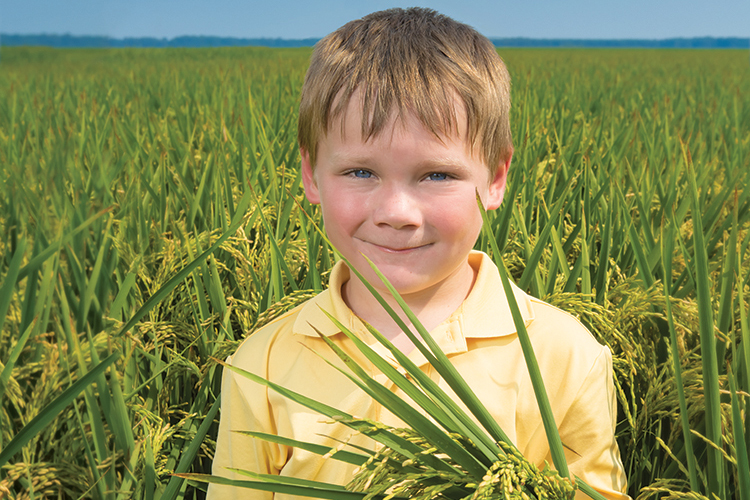
There is a historical marker situated on Noble Farms in Arkansas County that establishes the beginning of rice production in the state. Henry Prang, owner and operator of Prang Farms, cultivated rice in his front yard in 1906, beginning an expansion of rice into the area that eventually became the largest rice-producing county in Arkansas.
“I’ve driven by that historic marker on our farm all my life, but once we began farming near Crocketts Bluff, I finally stopped and took a good look at it one day,” says Andy Noble, owner of Noble Farms, which acquired the original Prang Farm land in 2007. “It was humbling to think that we now owned the land where rice farming began in Arkansas County.”
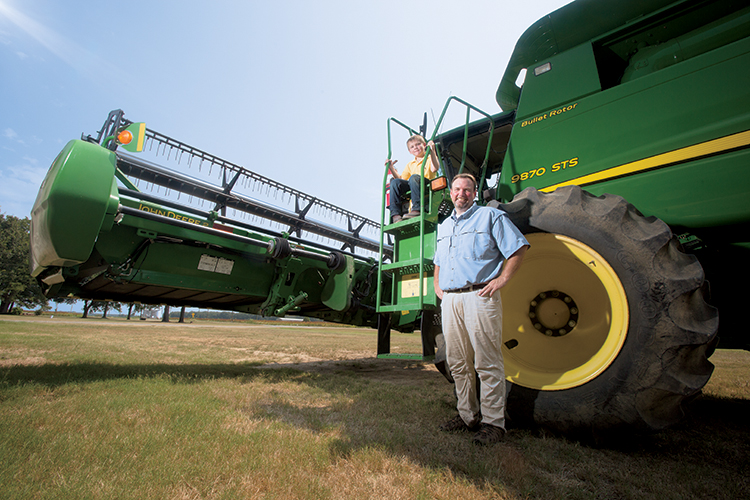
A Fourth-Generation Tradition
Noble Farms has been in operation since 1892, when Noble’s great-grandfather, William Edward Noble, purchased a small tract of land north of Ethel near the White River Refuge. His son, Morris, continued the farming operation and eventually passed it on to Andy’s father, James “Buddy” Noble. Andy Noble returned from college to begin farming in 2000.
“We are very proud that Noble Farms has survived four generations,” he says, “and I’m hopeful that one day my sons, Jack and Spencer, will carry on the tradition.”
Andy’s father, Buddy Noble, whom his grandchildren affectionately call “Big Dude,” retired a few years ago. Andy and his wife, Stephanie, manage the
farm operations today. But like any true family operation, Big Dude still plays an important role on the farm.
“I don’t think I could keep him away if I wanted to, which I don’t,” Noble says. “His input is invaluable.”
Like most farmers in the Delta and Grand Prairie, Noble Farms has a diversified crop mix and monitors the markets closely. In 2015, the farm’s rotation included rice, soybeans and sorghum. In past years, the family operation has grown corn, wheat and even sesame seeds.
“We always have our eyes on new opportunities to make the farm more profitable,” Noble says.
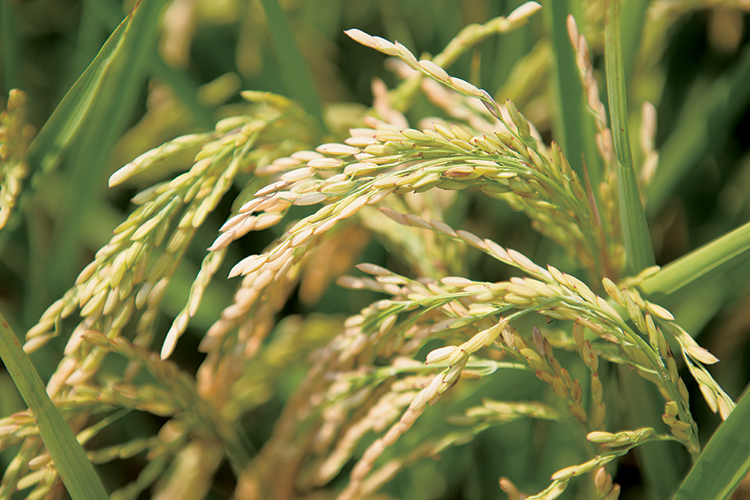
An Important Commodity For Arkansas
Arkansas has a unique blend of soil type, environment and water availability that makes it ideal for rice production. The soils in the eastern part of the state have good water holding capacity, making them excellent for maintaining the flooded conditions that rice prefers. During rice-growing season, the weather is warm with high humidity, which also helps drive rice growth and development.
“While Arkansas has led the United States in rice acreage and production for years, the 2015 growing season marked the first time that Arkansas accounted for more than 50 percent of the U.S. rice acreage and production,” says Wesley W. Ward, secretary of agriculture for the Arkansas Agriculture Department.
The state harvested rice on 1.48 million acres in 2014, for a market value of more than $1.4 billion. Arkansas is the top rice-producing state in the nation, with exports valued at $863 million.
“Rice farmers and millers account for over 25,000 jobs across the state,” Ward says, “which are crucial to rural communities and our overall state economy.”
The infrastructure associated with shipping, storage, marketing and processing makes the rice industry a multibillion dollar contributor to the Arkansas economy.
Rice – which was designated as the state’s official grain in 2007 – is primarily grown in the eastern region of the state with a significant concentration of acreage in Arkansas, Jackson, Poinsett, Lonoke and Cross counties. Currently, rice is produced in 38 of the state’s 75 counties.
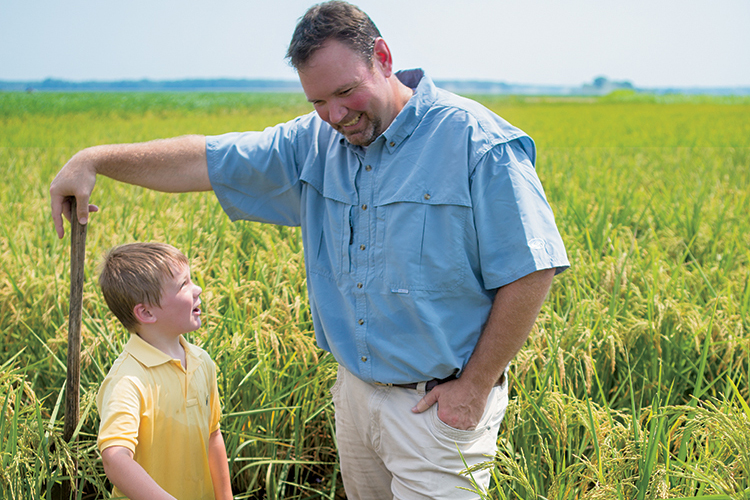
Acing Challenges
While Arkansas has great annual rainfall and underground aquifers, water quantity is a critical issue for rice producers.
“Input costs and labor are two of the largest challenges facing rice farmers,” Noble says. “We are a water-rich state, but the costs associated with irrigation continue to climb and it is one of the largest expenditures I make annually.”
Leaders in the rice industry proactively began engaging in responsible water stewardship practices long before the recent revelations about the depleting resource, Ward says. Challenges regarding the availability, conservation and regulation of water are prominent in the minds of growers and continue to be a priority for the industry.
Ward says the Arkansas Agriculture Department is encouraging strategic partnerships with entities such as the Natural Resources Conservation Service, the Arkansas Natural Resources Commission, the Nature Conservancy and the Arkansas Department of Environmental Quality. These partnerships will help the industry into the future as it deals with decreasing farming populations and an increasing global population.
“With a predicted global population of over 9 billion by 2050, the agriculture industry must continue to encourage a young generation of farmers,” Ward says. “Otherwise we risk losing the ability to produce our own food supply and ensure that it is safe for our families.”
Industry Of The Future
Andy Noble knows his family will be one that helps push the rice industry into the future. His wife’s family is deeply rooted in the state’s agriculture industry and Noble’s brother, Ben, serves as executive director of the Arkansas Rice Federation. Their children are already taking an active role on the farm.
“Farming is truly in my blood,” Noble says. “Regardless of whether they are actively farming, I suspect Noble Farms will be a part of the future for the fifth generation in one way or another.”
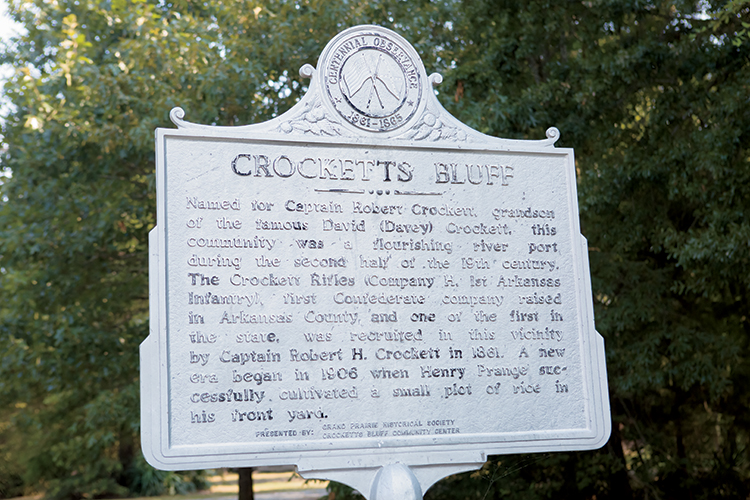
History Of Rice In Arkansas
Rice production reportedly began in Arkansas in 1902 with one acre of rice grown in Lonoke County. However, some historical records suggest that rice was grown in some parts of the state prior to the Civil War.
Official state records for rice production have been kept since 1905 for yields, harvested acres and prices. Rice acreage gradually increased until 1955 when the first government acreage controls stabilized rice production on about 500,000 acres. Marketing quotas were lifted in 1974 and rice acreage increased, reaching a peak in 1981 at 1.54 million harvested acres, which was not surpassed until 1999. The record harvested acreage for Arkansas was achieved in 2010 with 1.785 million acres.



